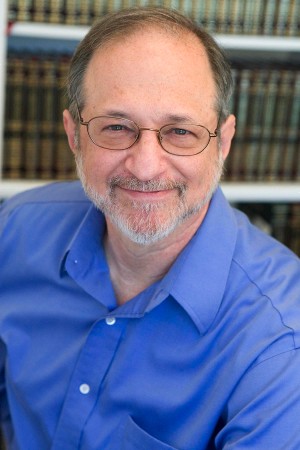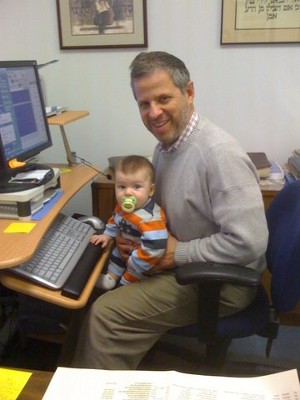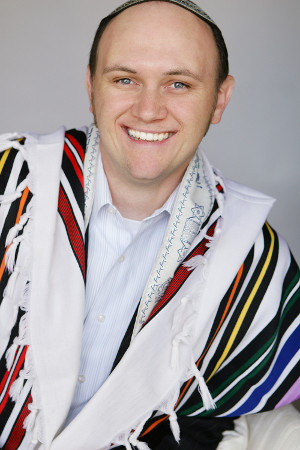Paul Saal

I don't have a Facebook page! I may well be the last holdout in North America, but I am so uncomfortable diluting the concept of friendship. Yeshua Rabenu referred to his talmidim as friends - and so if our Great Rabbi could eat, pray, laugh and mourn with those who called him rabbi, I want to take up the challenge to do likewise. As a rabbi of a small congregation I perform many functions. I am a teacher, an officiant, a counselor, an administrator, and a spiritual director; mostly though I like to think of myself as a community builder.
Jason Forbes

What do I enjoy most about being a rabbi? I love teaching and interacting with people in ways that challenge them to grow. For many years I've lead a mid-week Torah study with my community. I treasure the time when we can all interact with the Scriptures. We spend time understanding the stories and lives of the people on those pages. From these we learn about life's meaning, relationships, and holiness. It is most fulfilling when they encounter the "ahah" moment, when they understand a concept that they have been struggling with and the light finally turns on for them. I have many of my own "ahah" moments as I study with them. It is a privilege to learn alongside members of my community.
Carl Kinbar

My vocation as a rabbi is to teach and model the ways of God for Israel, especially the Messianic Jewish community. My main passion as a rabbi is to study and teach Torah. The best way to explain this passion is to describe what I do.
I am engrossed in fashioning an approach to Messianic Jewish Torah study that fully integrates the person, teaching, and work of Yeshua with serious study of traditional texts. It must honor those texts while also grappling with their problematic features. My Messianic Jewish students are my partners in this project - I do not only teach them, I learn from them.
Richard Nichol, PhD

My Passion in Life as a Rabbi
The celebration was a total surprise to me and my wife Sue.
During Oneg Shabbat (lunch after the morning Sabbath service), Josh, one of our Ruach Israel teens got up, and pretending to be me, asked the entire congregation to please finish eating and to move back into the sanctuary. There was to be a" special program" about which he and others seemed to anticipate. It took a few more minutes for us to catch on.
The program was a celebration, kept under wraps for months, for our 30 years of service to the synagogue. There were special songs written for the occasion, a nice gift, a giant card, a special dance, benign fun-poking at the rabbi and heart-warming expressions of gratitude. Sue and I came away with this overarching sense: "Congregational leadership since 1981 had been challenging in many ways, but overall, fabulously worth the effort. What terrific people! How kind and thoughtful they are!"
John Fischer, PhD

My rabbinic journey technically begins in Budapest, Hungary, the place of my birth. Since my grandfather ran a kosher butcher shop, perhaps it wasn't so surprising-but then again maybe it was-that my mother became Budapest's first licensed woman butcher. My father's family tended towards being Orthodox and later became even more so. There, in Budapest, my parents miraculously survived the Holocaust, with Raoul Wallenberg playing a significant part of that story. Interestingly, for the first several years of its existence the US Holocaust Museum would give out my mother's "story" as one of those it distributed to visitors to the Museum.
After the war, as the Iron Curtain of Soviet Communist rule was descending throughout Europe, including Hungary, my parents (along with my sister and me) made another supernatural escape. This time they landed on the shores of the United States even though we were ticketed for Paraguay. Through another series of small miracles-including an act of Congress-we were eventually allowed to remain here and became US citizens.
Joshua Brumbach
 I am often asked what I love most about being a rabbi. The answer is people. As a rabbi, we get to be involved in some of the most intimate and exciting aspects of people's lives - Bar and Bat Mitzvahs, weddings, and other joyous simchas. However, that also means we are there for the most difficult part of people's lives, as well - funerals, sickness, the death of a loved one, unemployment; and the list goes on.
I am often asked what I love most about being a rabbi. The answer is people. As a rabbi, we get to be involved in some of the most intimate and exciting aspects of people's lives - Bar and Bat Mitzvahs, weddings, and other joyous simchas. However, that also means we are there for the most difficult part of people's lives, as well - funerals, sickness, the death of a loved one, unemployment; and the list goes on.
Our tradition emphasizes the role of community. The Talmud states "Kol Yisrael arevim ze ba'ze - All Jews are responsible for one another (b. Shavuot 39a)." This means you cannot be Jewish by yourself. The need for, and care of, one another is built into our tradition. The importance of relationships and how we treat others is even further stressed by our Messiah.